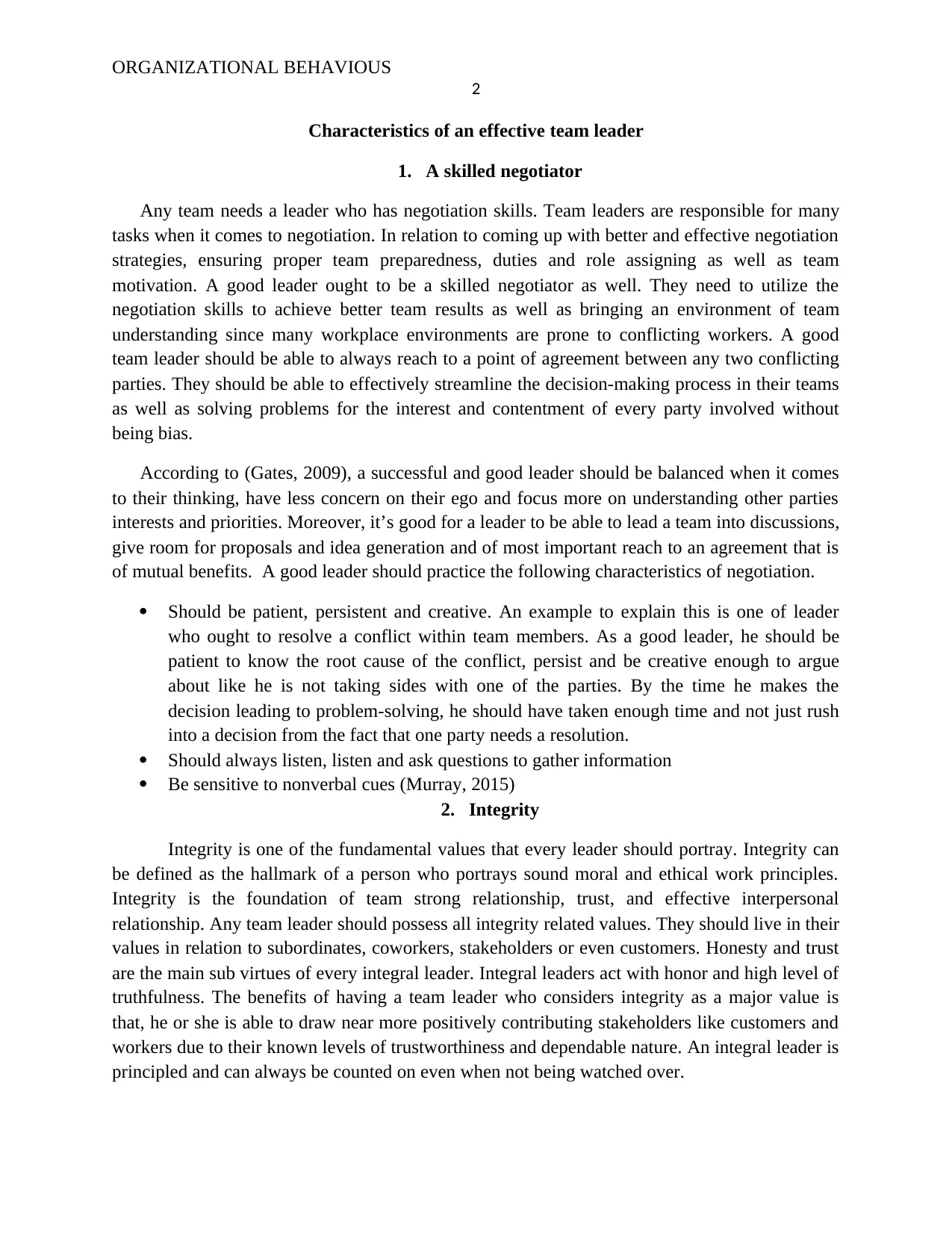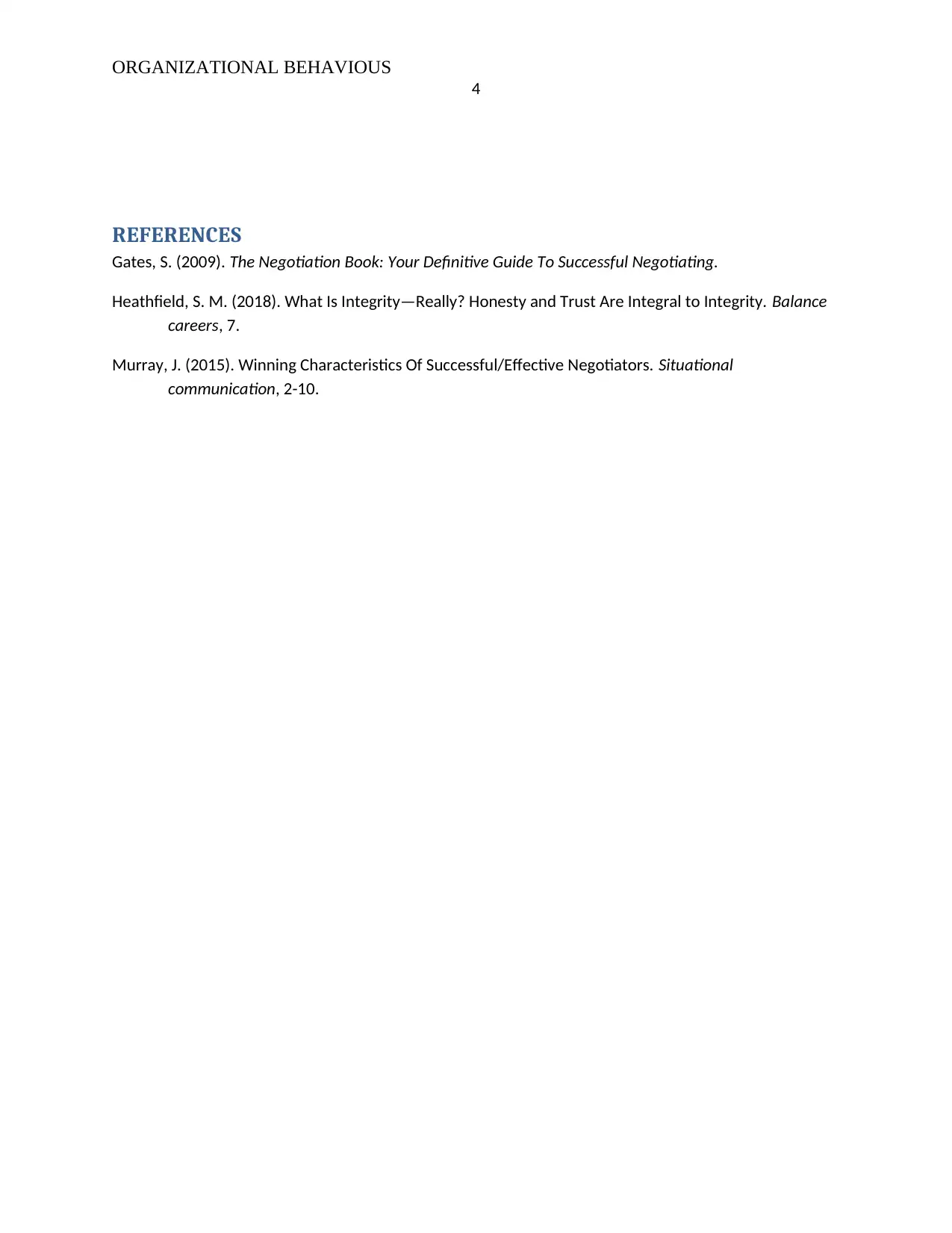Analysis of Effective Team Leadership: Negotiator and Integrity Roles
VerifiedAdded on 2023/05/29
|4
|705
|138
Essay
AI Summary
This essay examines two key characteristics of an effective team leader: skilled negotiator and integrity. A skilled negotiator is crucial for resolving conflicts, streamlining decision-making, and fostering team understanding by employing patience, active listening, and sensitivity to nonverbal cues. Integrity, defined as sound moral and ethical work principles, builds trust, strengthens relationships, and attracts positive stakeholders. An integral leader demonstrates honesty and can be relied upon even without direct supervision, fostering a culture of transparency and commitment within the team. The essay uses practical examples to illustrate how these characteristics contribute to successful team leadership.

Running head: ORGANIZATIONAL BEHAVIOUS
1
Name
Course
Lecturer
Date
1
Name
Course
Lecturer
Date
Paraphrase This Document
Need a fresh take? Get an instant paraphrase of this document with our AI Paraphraser

ORGANIZATIONAL BEHAVIOUS
2
Characteristics of an effective team leader
1. A skilled negotiator
Any team needs a leader who has negotiation skills. Team leaders are responsible for many
tasks when it comes to negotiation. In relation to coming up with better and effective negotiation
strategies, ensuring proper team preparedness, duties and role assigning as well as team
motivation. A good leader ought to be a skilled negotiator as well. They need to utilize the
negotiation skills to achieve better team results as well as bringing an environment of team
understanding since many workplace environments are prone to conflicting workers. A good
team leader should be able to always reach to a point of agreement between any two conflicting
parties. They should be able to effectively streamline the decision-making process in their teams
as well as solving problems for the interest and contentment of every party involved without
being bias.
According to (Gates, 2009), a successful and good leader should be balanced when it comes
to their thinking, have less concern on their ego and focus more on understanding other parties
interests and priorities. Moreover, it’s good for a leader to be able to lead a team into discussions,
give room for proposals and idea generation and of most important reach to an agreement that is
of mutual benefits. A good leader should practice the following characteristics of negotiation.
Should be patient, persistent and creative. An example to explain this is one of leader
who ought to resolve a conflict within team members. As a good leader, he should be
patient to know the root cause of the conflict, persist and be creative enough to argue
about like he is not taking sides with one of the parties. By the time he makes the
decision leading to problem-solving, he should have taken enough time and not just rush
into a decision from the fact that one party needs a resolution.
Should always listen, listen and ask questions to gather information
Be sensitive to nonverbal cues (Murray, 2015)
2. Integrity
Integrity is one of the fundamental values that every leader should portray. Integrity can
be defined as the hallmark of a person who portrays sound moral and ethical work principles.
Integrity is the foundation of team strong relationship, trust, and effective interpersonal
relationship. Any team leader should possess all integrity related values. They should live in their
values in relation to subordinates, coworkers, stakeholders or even customers. Honesty and trust
are the main sub virtues of every integral leader. Integral leaders act with honor and high level of
truthfulness. The benefits of having a team leader who considers integrity as a major value is
that, he or she is able to draw near more positively contributing stakeholders like customers and
workers due to their known levels of trustworthiness and dependable nature. An integral leader is
principled and can always be counted on even when not being watched over.
2
Characteristics of an effective team leader
1. A skilled negotiator
Any team needs a leader who has negotiation skills. Team leaders are responsible for many
tasks when it comes to negotiation. In relation to coming up with better and effective negotiation
strategies, ensuring proper team preparedness, duties and role assigning as well as team
motivation. A good leader ought to be a skilled negotiator as well. They need to utilize the
negotiation skills to achieve better team results as well as bringing an environment of team
understanding since many workplace environments are prone to conflicting workers. A good
team leader should be able to always reach to a point of agreement between any two conflicting
parties. They should be able to effectively streamline the decision-making process in their teams
as well as solving problems for the interest and contentment of every party involved without
being bias.
According to (Gates, 2009), a successful and good leader should be balanced when it comes
to their thinking, have less concern on their ego and focus more on understanding other parties
interests and priorities. Moreover, it’s good for a leader to be able to lead a team into discussions,
give room for proposals and idea generation and of most important reach to an agreement that is
of mutual benefits. A good leader should practice the following characteristics of negotiation.
Should be patient, persistent and creative. An example to explain this is one of leader
who ought to resolve a conflict within team members. As a good leader, he should be
patient to know the root cause of the conflict, persist and be creative enough to argue
about like he is not taking sides with one of the parties. By the time he makes the
decision leading to problem-solving, he should have taken enough time and not just rush
into a decision from the fact that one party needs a resolution.
Should always listen, listen and ask questions to gather information
Be sensitive to nonverbal cues (Murray, 2015)
2. Integrity
Integrity is one of the fundamental values that every leader should portray. Integrity can
be defined as the hallmark of a person who portrays sound moral and ethical work principles.
Integrity is the foundation of team strong relationship, trust, and effective interpersonal
relationship. Any team leader should possess all integrity related values. They should live in their
values in relation to subordinates, coworkers, stakeholders or even customers. Honesty and trust
are the main sub virtues of every integral leader. Integral leaders act with honor and high level of
truthfulness. The benefits of having a team leader who considers integrity as a major value is
that, he or she is able to draw near more positively contributing stakeholders like customers and
workers due to their known levels of trustworthiness and dependable nature. An integral leader is
principled and can always be counted on even when not being watched over.

ORGANIZATIONAL BEHAVIOUS
3
An example of integrity virtue in a leader can be a situation whereby the team leader who
in this case is company CEO keeps updated information to all the employees. It reaches a point
where employees feel like they are aware of everything and exactly how it happens. When the
CEO requests that they all take 10% pay cut to cater possible layoff, these employees
unanimously agree with the CEO since they feel his honesty and trust him. (Heathfield, 2018)
3
An example of integrity virtue in a leader can be a situation whereby the team leader who
in this case is company CEO keeps updated information to all the employees. It reaches a point
where employees feel like they are aware of everything and exactly how it happens. When the
CEO requests that they all take 10% pay cut to cater possible layoff, these employees
unanimously agree with the CEO since they feel his honesty and trust him. (Heathfield, 2018)
⊘ This is a preview!⊘
Do you want full access?
Subscribe today to unlock all pages.

Trusted by 1+ million students worldwide

ORGANIZATIONAL BEHAVIOUS
4
REFERENCES
Gates, S. (2009). The Negotiation Book: Your Definitive Guide To Successful Negotiating.
Heathfield, S. M. (2018). What Is Integrity—Really? Honesty and Trust Are Integral to Integrity. Balance
careers, 7.
Murray, J. (2015). Winning Characteristics Of Successful/Effective Negotiators. Situational
communication, 2-10.
4
REFERENCES
Gates, S. (2009). The Negotiation Book: Your Definitive Guide To Successful Negotiating.
Heathfield, S. M. (2018). What Is Integrity—Really? Honesty and Trust Are Integral to Integrity. Balance
careers, 7.
Murray, J. (2015). Winning Characteristics Of Successful/Effective Negotiators. Situational
communication, 2-10.
1 out of 4
Related Documents
Your All-in-One AI-Powered Toolkit for Academic Success.
+13062052269
info@desklib.com
Available 24*7 on WhatsApp / Email
![[object Object]](/_next/static/media/star-bottom.7253800d.svg)
Unlock your academic potential
Copyright © 2020–2026 A2Z Services. All Rights Reserved. Developed and managed by ZUCOL.





